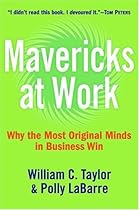[PDF] A Manifesto For Mavericks
 Bill Taylor and Polly Labarre are the authors of Mavericks at Work a book that asserts an n irresistible mantra for social entrepreneurs;
Bill Taylor and Polly Labarre are the authors of Mavericks at Work a book that asserts an n irresistible mantra for social entrepreneurs;In an age of hyper-competition and nonstop innovation, the only way to stand out from the crowd is to stand for something truly original.Bill is the co founder and founding editor of Fast Company. Polly was one of the original core contributors to the same magazine.
Aside from the widely available book, Bill and Polly created a manifesto at ChangeThis - see A Manifesto For Mavericks.
We think their message to business isn't the only suitable audience. Here are 10 questions they think should be asked:
- Is there a distinctive and disruptive sense of purpose that sets you apart from the competition?
The best companies are the ones that stand for the most original and compelling ideas. What ideas are you and your company fighting for? - Can you be provocative without provoking a backlash?
There’s a difference between challenging the status quo and inviting retribution from rivals that are bigger, richer, and more ruthless than you. One key test of any would-be disruptor is whether he or she can also be a convincing diplomat. - If your company went out of business tomorrow, who would miss you and why?
We first heard this question from advertising maverick Roy Spence, who tells us that he got it from Jim Collins of Good to Great fame. Whatever the original source, the question is as profound as it is simple — and worth taking seriously. - Are you the kind of person that other smart people want to work with?
If you expect outsiders (or even colleagues) to share their best ideas with you, then don’t be surprised when they expect something in return. It can be money, it can be recognition, but more often than not, what draws people into open-source projects is the chance to push themselves and develop their skills. - Can you make innovation fun?
Ideas are serious business, but if you’re working to tap the brainpower of outside-the mainstream contributors, then you have to work to keep your open-source project colorful, dramatic, and energetic. - Do you treat different customers differently?
If your goal is to establish a psychological contract with customers, then almost by definition you won’t appeal to all customers. One test of how committed a company is to its most important customers is how fearless it is about ignoring (even offending) customers who aren’t central to its mission. Not all customers are created equal. - Why should great people join your organization?
The best leaders understand that the best rank-and-file performers aren’t motivated primarily by money. Great people want to feel like impact players inside their organizations. Great people want to be surrounded with and challenged by other great people. Put simply, great people want to feel like they’re part of something greater than themselves. Does your company give them that chance? - Do you know a great person when you see one?
In organizations that are serious about competing on talent, who you are as a person is as important as what you know at a moment in time. That is, character counts for as much as credentials. Do you know how to conduct a character test? - Does your organization work as distinctively as it competes?
It’s a simple question with huge implications for productivity and performance. Leaders who are determined to elevate the people factor in business understand that the real work begins once talented people walk through the door. HR maverick John Sullivan says it best: “Stars don’t work for idiots.” - Are you learning as fast as the world is changing?
We first heard this question from Gary Hamel, the world-renowned strategy guru, and it’s the ultimate challenge for any executive or entrepreneur. The best leaders we’ve met, regardless of their age, experience, or personal style, have all been insatiable learners. In a business environment that never stops changing, you can never stop learning.
---------------------
Interested in learning more about social enterprise? Take a browse through the Vancouver Social Enterprise Book Store (Vancouver | United Kingdom | United States) and see what other social entrepreneurs recommend reading.
 Tags for information about: for:vsef, Social Enterprise, Management, ChangeThis
Tags for information about: for:vsef, Social Enterprise, Management, ChangeThis
--------------------
Labels: Fast Company, Recommended Read




0 Comments:
Post a Comment
<< Home